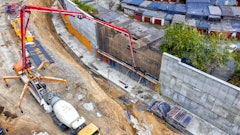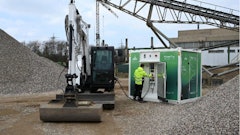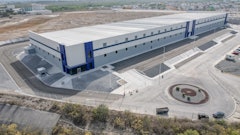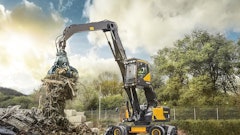
Only a third of U.S. states added construction jobs from just prior to the start of the COVID-19 pandemic through October 2021, according to an analysis by the Associated General Contractors of America (AGC). Ken Simonson, the association’s chief economist, attributes the shortfall to a lack of skilled labor.
“Although activity picked up in most states in October, construction employment remains below pre-pandemic levels in two out of three states,” he noted. “The record number of job openings shows contractors are eager to hire more workers but can’t find enough qualified applicants.”
The analysis examines data stemming from February 2020, the month before the COVID-19 pandemic caused projects to be halted or cancelled, through October of this year. It shows:
- Construction employment declined in 33 states, stalled in Hawaii and increased in just 16 states and D.C.
- Texas saw the largest number of construction job losses at 46,400 (-5.9%), followed by New York at 42,800 and California at 21,300 jobs (-2.3%). The largest losses on a percentage basis were in Wyoming (-14% or 3,200 jobs), New York (-10.5%) and Vermont (-9.8% or 1,500 jobs).
- Utah added the most jobs at 8,200 (+7.2%), followed by North Carolina at 7,700 jobs (+3.3%) and Washington and Idaho, which both added 4,900 jobs (+2.2% and +8.9%, respectively) and saw larger percentage gains. Only South Dakota saw a higher percentage increase (10.5% or 2,500 jobs).
On a month-to-month basis, construction employment fell in 14 states and increased in 34 states and D.C. from September 2021 to October 2021; it remained unchanged in Alabama and Virginia. The largest job gains were in Louisiana (8,200 jobs, 7.1%) and California (7,500 jobs, 0.8%).
Build Back Better Not Better for Construction?
In announcing its analysis of the jobs data, AGC officials expressed concerns that the proposed Build Back Better legislation – aimed at allocating funds toward social welfare and climate change initiatives, and passed by the House on November 19th – could undermine the construction sector’s recovery.
Originally presented as a massive $2 trillion spending package encompassing infrastructure, manufacturing, innovation, research and development and clean energy investment, the proposed legislation was ultimately split into two separate pieces of legislation, consisting of the infrastructure bill signed into law on November 15th, and the now separate plan focused on broader social and environmental issues.
To cover its costs, the Build Back Better framework includes several tax provisions that would increase the percentage of taxes and apply surcharges on corporations and the wealthiest Americans, among other provisions. In addition, it contains severe new penalties for employer unfair labor practices.
In a statement following House passage of Build Back Better through the budget reconciliation process, AGC officials indicated that “the measure’s tax and labor provisions will stifle investments in construction activity and make it even harder for firms to find qualified workers to hire.” AGC leaders argue that such provisions will have a negative impact on the industry's recovery and related job growth.
“The last thing Washington should be doing is making it even harder for firms to find projects to build or workers to hire,” stated Stephen E. Sandherr, AGC’s CEO. “Yet, the hyper-partisan Build Back Better bill will hobble employers with new mandates even as it stifles private sector demand with new taxes and regulations.”
AGC officials have urged Senators to reject the spending bill, which could come up for a vote as early as the week of December 13th.
They aren't alone in expressing concerns about the legislation's impact on the industry. Michael Bellaman, president and CEO, Associated Builders and Contractors (ABC), issued a strongly worded opposition statement upon House passage:
“This partisan, reckless tax and spending bill would devastate the U.S. economy, further exacerbate supply chain and inflation woes, and impose dangerous tax hikes and restrictive labor policies that harm the 87.3% of the construction workforce that chooses not to join a union. This bill would make it difficult for small contractors to stay in business, hire new workers and provide competitive pay and benefits for their employees."
He added that the ABC encourages the Senate to reject the House version of the bill and instead "work to support commonsense policies that will benefit our economy and create jobs throughout the country."
Information provided by the Associated General Contractors of America was used as a primary resource for this article.






























